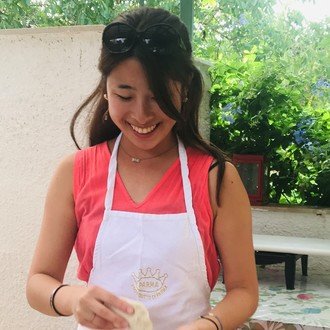
イタリア庶民料理の研究〜歴史上’声なき’人々の料理を紡ぎたい〜マンスリーレポートVol.6(2023年6月)
皆様、チャオです!
ボローニャ大学歴史文化学部で、イタリア料理の研究をしております、中小路葵です。
研究を応援して下さる皆様に向け、活動報告としてマンスリーレポートをお届けします。
卒業論文、提出!
ついに、ついに卒業論文を提出しましたー!!
決して、決して平らな道ではなくて、
人知れず(人知れても)沢山の涙を流しましたが、
幾つもの日々を越えて、たどり着いた今があること、
本当に嬉しく、今だけは少し誇りに思います。
ボローニャ大学歴史学部の修士論文、全275ページ。
テーマは「イタリア農家料理」。
舞台は20世紀のエミリアのポー平原と、プーリアのムルジャ平原。
文献に残らない’声なき’庶民の料理文化を、オーラル・ヒストリーのアプローチで解き明かします。
家庭を訪ね、おばあちゃんの当時の料理を作ってもらい、彼らのライフストーリーを聞き、20世紀後半の農家料理の変化を考察しました。
大好きなテーマだったはずなのに、プレッシャーと、自分の能力を超えた挑戦の負荷とで、辛くて苦しくて、何度も諦めかけました。
しかし、支えてくれる方、料理を見せてくれた方々の応援のおかげで、最後までやり切ることが出来ました。
今は、この挑戦ができたこと、やっぱり心からワクワクするテーマに出会えたこと、とても嬉しく思います。
感謝を胸に、この経験を力に、次の挑戦に進みたいと思います。
まだまだ審査はこれからですが、一旦提出できたこと、皆様に報告させて頂きます!
目次
List of Figures
A table connects the dots
A microhistory of a researcher
Acknowledgement
Introduction
1-1. Thesis statement
1-2. Academic background
1-2-1. Food studies in global history
1-2-2. Oral history in food studies
1-3. Aim of project
1-4. Research questions
1-5. Thesis structureLiterature review
2-1. Defining peasants’ cooking
2-2. Geographical features
2-2-1. Po Valley in Emilia
2-2-2. Murgia in Puglia
2-3. Agrarian history in the 20th century
2-3-1. The Po Valley in Emilia
2-3-2. Murgia in Puglia
2-4. Social changes impacting the peasants’ cooking
2-4-1. Economic miracle and industrialization
2-4-2. Household changes
2-4-3. Globalization of food system.
2-5. Modern culinary outlook
2-6. Circulation of culinary knowledgeMethodology
3-1. Purpose
3-2. Research Design
3-3. Interview equipment
3-4. Interview questions design
3-5. Interviewee collection.
3-6. Interviewee profiles
3-7. Analytical procedures
3-8. Ethical considerations
3-9. LimitationFindings
4-1. What the peasants in the Po Valley and Murgia had eaten before the 1960s
4-1-1. Daily cooking by mealtime in the Po Valley
4-1-2. Daily cooking by mealtime in Murgia
4-1-3. Daily cooking by foods in the Po Valley
4-1-4. Daily cooking by foods in Murgia
4-1-5. Festive cooking in the Po Valley
4-1-6. Festive cooking in Murgia
4-2. How the peasants’ cooking has changed after the 1960s
4-2-1. Changes in the Po Valley
4-2-2. Changes in Murgia
4-2-3. Additional transitional factors in the Po Valley
4-2-4. Additional transitional factors in Murgia
4-2-5. ContinuityDiscussion
5-1. Features and myths of peasants’ cooking in cross-reference
5-1-1. Creativity
5-1-2. Conviviality
5-1-3. Shared knowledge
5-2. Transition of peasants’ cooking in cross-reference
5-2-1. The 1960s
5-2-2. The 1970s
5-2-3. The 1980s
5-3. Methodological Discussion
5-3-1. Review of the purpose and methodological design
5-3-2. Validations on each phase of interview
5-3-3. Two pieces of advice for best practices
5-3-4. Limitations
5-3-5. Contribution to the community
5-3-6. A dialogical relationship
5-3-7. Conclusion of methodological validationConclusion
6-1. Summary of findings and discussions
6-2. Validation of methodology
6-3. Possible future study
6-4. Final reflectionReferences
Appendix 1. Interview Profiles and recipes
Appendix 1-1. The Po Valley, Emilia
Appendix 1-2. Murgia, Puglia
Appendix 2. Informed consent for the interview
Interview transcripts
1. The Po Valley, Emilia
2. Murgia, Puglia
研究の概要
Research topic
Features and transformation of peasants’ culinary culture in the Po Valley, Emilia and Murgia, Puglia in the 20th century
Research Questions
What are the features of peasants’ culinary culture in the Po Valley and Murgia?
How has it changed in the late 20th century, impacted by globalization and social changes?
Background
Food studies in global history
Food studies can be the window through which we see many latent aspects of marginalized human culture by applying an interdisciplinary approach to study the effects of geographical, political, social, economic, historical changes from global perspectives
-> Potential for private cooking sphere of common people
Oral history in food studies
Oral history became a potential approach, enabling us to capture the actual history of the unvoiced people with bottom-up narratives.
-> Potential in methodological development
Research purpose
Contribution to the academic knowledge
Discover new insights of peasants’ cooking and its change in the late 20th century in the Po Valley, Emilia and Murgia in PugliaEstablishment of methodology
Try one method of using an oral history approach in food studies for common people’s culinary culture
Methodology
Oral history approach
Fieldwork Interview in families X cross-reference of existing materials

Interviewees in the Po Valley, Emilia

Interviewees in Murgia, Puglia

Findings
What the peasants in the Po Valley and Murgia had eaten before the 1960s

By mealtime, foods, festive cooking
2. How the peasants’ cooking has changed after the 1960s

By mealtime, foods, festive cooking
+ Additional factors:
kitchen equipment, grocery shopping, cross-cultural contacts, recipe circulation, eating out
Discussion
Interview narratives X cross-reference of existing materials
Features and myths of peasants’ cooking
Creativity
Conviviality
Shared knowledge


2.Transition of peasants’ cooking in cross-reference
the 1960s
the 1970s
the 1980s onwards
3.Methodological validation
POINT 1 Combination of cooking session and table narratives
POINT 2 Cross-reference of interview narratives with existing materials
Limitations
Contributions to the community
Conclusion
Summary of insights
Methodological valudation
Possible future research : city, cultural heritage
Final reflection
感謝
本当に、沢山の涙を流してきましたが、最後にこうして論文を仕上げることができました。
ここまで来れたのは、皆様の応援のおかげです。
どうも有難うございます。
そして、これからも一緒にディープな研究の挑戦の旅を楽しめると嬉しいです!
宜しくお願い致します!
研究のサポート
研究のサポートメンバーを募集しています。
詳細・応援頂ける方、こちらよりどうぞ宜しくお願い致します!
ここから先は

ボローニャ大学修士、料理史学徒の研究ノート
ボローニャ大学修士、歴史文化学「Global Cultures: Food History」専攻の学生が、研究内容を共有するマガジン ・…
この記事が気に入ったらチップで応援してみませんか?
